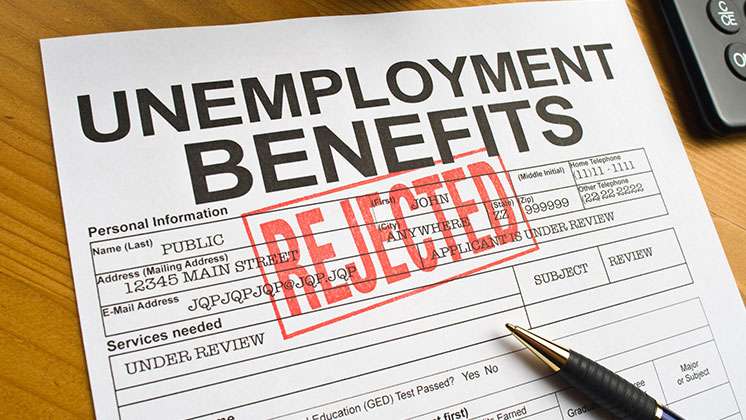Can You Receive Workers’ Comp and Unemployment Benefits in Virginia?

Among Virginian employees, a common question that arises is whether they can receive both workers’ compensation and unemployment benefits simultaneously in Virginia. The answer is that it depends on the situation. In rare cases, it is possible to receive some workers’ comp and unemployment benefits at the same time, but in general, these two benefits cannot be granted concurrently.
Let’s take a look at the intricacies of these two benefit systems, their eligibility criteria, and the circumstances under which they may intersect.
Worker’s Compensation Versus Unemployment Benefits in Virginia
Who Can Receive Benefits
A primary difference between unemployment and workers’ compensation is that workers’ comp is meant for employees who have suffered a job-related injury or illness, while unemployment benefits are for individuals who have lost their job through no fault of their own.
Main Eligibility Requirements
You may claim workers’ comp in Virginia whether you’re completely unable to work or can only do light work – as long as you can prove that your injury is job-related. This compensation is designed to supplement or replace your lost income while you are recovering.
On the other hand, to claim unemployment, you don’t need to prove an occupational injury, but you would need to have severed ties from your employer. Unemployment benefits are meant to assist you while you look for a new job.
Who Provides the Benefits
Workers’ comp is available through your employer’s workers’ compensation insurance, which they are typically required to have by law. Meanwhile, unemployment benefits are administered by the state. These two benefit systems are handled by two different agencies in Virginia: the Virginia Workers’ Compensation Commission (VWC) and the Virginia Employment Commission (VEC).
Can You Receive Both Workers’ Comp and Unemployment Benefits at the Same Time in Virginia?
The short answer is: generally, no. In most cases, an individual cannot receive both workers’ compensation and unemployment benefits simultaneously in Virginia. However, there are some exceptions and nuances to this rule.
One situation where you could potentially receive both unemployment and workers’ comp is if you sustained a work injury, was restricted to light-duty work, and then lost your job while already receiving workers’ comp.
In this case, if your workers’ comp payments are less than the unemployment payments, you could potentially claim the remaining unemployment amount. In other words, the weekly amount of your workers’ compensation payment will be deducted from your unemployment benefits.
Note that the above scenario can only happen if you’ve been cleared for light-duty work. If your doctor declares that you are completely disabled from working, you can only receive workers’ comp and not unemployment. This is because unemployment benefits require that you are able to and actively looking for a new job.
Other Exceptions and Special Circumstances
While it’s generally not possible to receive both benefits simultaneously, there are some situations where an individual might transition from one benefit to the other:
- Partial disability: If an employee is on partial disability through workers’ compensation and their employer cannot accommodate their restrictions, they may be eligible for unemployment benefits.
- Claim denial: If a workers’ compensation claim is denied, and the individual is able to work but unemployed, they may qualify for unemployment benefits.
- Exhaustion of benefits: If an individual has exhausted their workers’ compensation benefits but is still unemployed, they may then become eligible for unemployment benefits, provided they meet all other criteria.
Virginia Workers’ Comp Guidelines Regarding Unemployment Benefits
The Virginia Workers’ Compensation Commission provides the following guidelines:
- You will not be eligible for unemployment benefits if a work-related injury has rendered you completely unable to work.
- You may qualify for unemployment benefits if your workers’ compensation claim was denied and you were given light-duty limitations.
- You could be eligible to apply for unemployment benefits if you were laid off or if your employer won’t accept your light-duty limitations.
Potential Conflicts Between Workers’ Comp Eligibility and Unemployment Benefits That You Need To Be Aware Of
The primary conflict between these two benefit systems lies in their fundamental requirements:
- Ability to work: Unemployment benefits require that you are able and available to work. Workers’ compensation, particularly in cases of total disability, implies that you are unable to work due to your injury.
- Actively seeking employment: To receive unemployment benefits, you must actively search for work. This requirement may be difficult to fulfill if you are recovering from a work-related injury.
- Wage replacement: Both systems provide a form of wage replacement, which could lead to double compensation if received simultaneously.
Legal Considerations and Potential Consequences
It’s crucial to be honest and transparent when applying for either workers’ compensation or unemployment benefits. Attempting to receive both simultaneously without meeting the specific criteria for exceptions could lead to serious consequences such as:
- Repayment: If you receive unemployment benefits and later win a workers’ compensation claim for the same period, you may be required to repay the unemployment benefits to the Virginia Employment Commission.
- Disqualification: Misrepresentation on either application could lead to disqualification from future benefits.
- Fraud charges: Knowingly collecting both benefits improperly could be considered fraud.
The Role of Legal Representation
While it’s possible to navigate these systems on your own, the complexities of workers’ compensation and unemployment law often requires professional legal assistance. An experienced attorney can:
- Advise you on the potential interplay between workers’ compensation and unemployment benefits
- Help you understand your rights and options
- Guide you on legally maximizing your compensation
- Ensure that all necessary documentation is properly filed
- Represent you in hearings or appeals.
In Virginia, Jaleh Slominski of Slominski Law has extensive experience in workers’ compensation cases. With offices in Lynchburg and Roanoke, she provides personalized legal representation to clients throughout Western Virginia.
Frequently Asked Questions (FAQs)
Is it possible for me to apply for unemployment insurance and workers’ compensation at the same time?
Yes, you can simultaneously apply for workers’ compensation and unemployment benefits where the result would be getting benefits of one or the other but not both at the same time. However, if you’re unsure how these would apply to your situation, it’s best to consult a lawyer first. Certain missteps in applications could put your benefits at risk.
Are there any situations in which applying for workers’ compensation and unemployment benefits at the same time is beneficial?
If you lost your job while under light-duty restrictions due to a work injury and your employer or its workers’ compensation insurance carrier is rejecting your first claim for benefits or change in condition application, it may be advantageous to file for both unemployment and workers’ compensation. Make sure to consult with a Virginia workers’ comp attorney first with the details of your employment status to make sure if this is the right move for you.
Where do I get help when applying for worker’s comp or unemployment benefits in VA?
Given the complexity of these systems and the potential for overlap, it’s advisable to seek guidance when applying for either workers’ compensation or unemployment benefits:
- Workers’ compensation: Consult with an experienced workers’ compensation attorney who can guide you through the process and ensure your rights are protected.
- Unemployment benefits: The Virginia Employment Commission provides resources and assistance for filing unemployment claims. You can file online or by phone at 1-866-832-2363.
- Appeals: Both systems have appeal processes if your claim is denied. For workers’ compensation, you have 30 days to appeal a decision to the VEC. For unemployment benefits, you have 30 days to appeal a decision.
What documentation do I need for workers’ compensation benefits and unemployment benefits?
Whether you’re applying for workers’ compensation or unemployment benefits, proper documentation is crucial. This includes:
- Medical records and doctor’s notes for workers’ compensation claims
- Employment records and separation documents for unemployment claims
- Job search records for unemployment benefits
- Any correspondence with employers regarding work limitations or accommodations.
Keeping thorough records can help prevent misunderstandings and protect your rights throughout the claims process.
If I receive unemployment benefits, will I lose my lifetime medical award for my work injury?
No. Regardless of your work status, your employer at the time of your injury and its insurance provider are still liable for paying for any medical care that is reasonable, required, approved, and directly related to your occupational sickness or work injury. This holds true whether you lose your job or switch employers.
Which provides longer benefits: workers’ compensation or unemployment?
Compared to unemployment compensation, you may be eligible for workers’ compensation benefits for a far longer duration.
You can receive up to 500 weeks of income replacement benefits and lifetime medical benefits for your work injuries under the Workers Compensation Act. Certain individuals can even be eligible for total and permanent disability payments, which provide income replacement for the rest of your life.
Benefits from unemployment insurance are paid for a maximum of 26 weeks. However, federal law may extend this time if there are exceptional circumstances, such as the coronavirus pandemic.
If an on-the-job injury has left me completely disabled from my job, should I apply for unemployment benefits?
No. If you are unable to perform any kind of labor, the VEC will automatically reject your unemployment claim. Additionally, if you are completely incapacitated, you are not required to hunt for a job, thus there is no need to register with the Virginia Workforce Connection.
Note that claiming to be completely handicapped while receiving unemployment benefits will damage your reputation and probably result in the loss of your workers’ compensation case. If you inform the Workers Compensation Commission that you are unable to work while telling the VEC that you are capable of working, the deputy commissioner overseeing your work injury case will likely object.
How can I quickly determine if I should apply for workers’ comp or unemployment benefits?
Two key factors determine eligibility for both benefits:
Work Capability
Your ability to work is crucial. If doctors declare you completely unable to work, you’ll likely only qualify for workers’ compensation. However, if you can perform modified or light-duty work, you might be eligible for unemployment benefits while seeking suitable employment.
Employment Status
Simply being away from work due to injury doesn’t qualify as job loss for unemployment purposes. If your employer is holding your position while you recover, you’re not considered unemployed. In this case, workers’ compensation wage replacement would be the appropriate benefit.
A temporary medical leave differs from true unemployment. If your job remains secure, you should pursue workers’ compensation benefits rather than unemployment insurance.
This complex situation requires careful evaluation of your specific circumstances and may benefit from an attorney’s guidance to ensure proper benefit coordination.
Workers’ Comp or Unemployment in Virginia? Get the Guidance of Attorney Jaleh Slominski.
While it’s not common to receive both workers’ compensation and unemployment benefits simultaneously in Virginia, there are legal ways to ensure you get the maximum benefits you deserve. If you’re considering applying for either or both of these benefits, it’s crucial to seek professional guidance.
Contact Attorney Jaleh Slominski at Slominski Law. With nearly 30 years’ experience in workers’ compensation law, she can provide valuable guidance as you navigate these complex systems. Your consultation is free. Call Slominski Law at (434) 384-9400 for our Lynchburg office or (540) 554-3762 for our Roanoke office.





